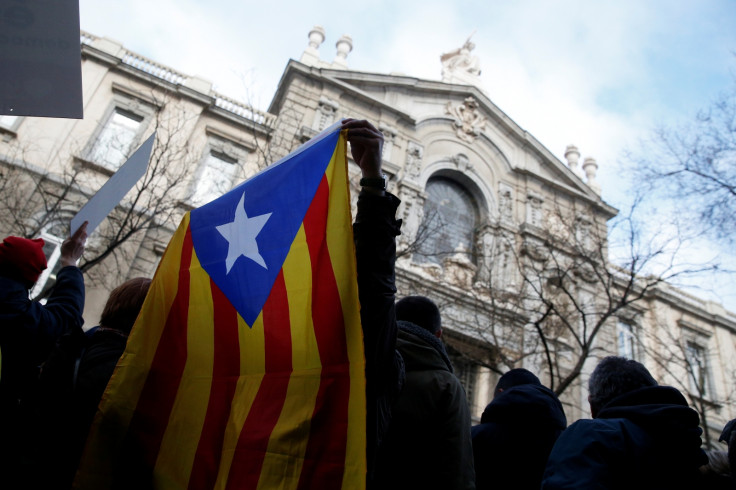Catalan independence may have to wait - our weakened Europe is divided enough
Catalonia should rethink pushing forward with a referendum in defiance of Spain.

The Catalan government took a further step yesterday towards an out-and-out clash with the Spanish state. On 28 February, the coalition of parties Junts pel Sí ("Together for Yes"), whose leaders form the greater part of Catalonia's government, presented a white paper to modify the Catalan Parliament's set of rules with the aim of passing the "llei de desconnexió" ("the disconnection law", from Spain) through one single reading instead of the customary two.
Thus far, the single reading is only permitted for bills presented either by the Catalan government or by all parliamentary groups put together. Junts pel Sí now wants this to be changed so that one parliamentary group alone could have its proposals read only once. However, a formal defect was found by the Chamber's legal representatives and the whole procedure will thus be delayed by another week.
The passing of such a law would represent a "point of no return in the independence process", El País' political reporter Pere Ríos has written today from Barcelona. How come? One reading alone would allow separatists to skip the otherwise obligatory judgement by the Consell de Garanties Estatutàries (Council of Statutory Guarantees), a juridical body, based in Barcelona, whose job is to verify compliance with Catalonia's Statute of Autonomy as well as the Spanish Constitution.
But there's a distinctly more pressing aspect in all this manoeuvering: it would stop the opposition from presenting amendments to this law effectively calling for an independence referendum.
Silencing an opposition is undemocratic. No ifs or buts. "It's worrying, because you shrink both the debate and the deputies' amendment rights," commented Xavier Arbós, a professor of Constitutional Law at the University of Barcelona, in El País. This has now cast an ominous authoritarian shadow on an otherwise legitimate debate within Catalan society.
Because the fundamental question remains: how many Catalans – among whom, it must be said, many are Spanish native speakers and the rest are perfectly bilingual individuals (unlike in other parts of Europe prone to secession bouts) – really want to break away from Spain? The answer is: we don't know. Polls are just polls, after all: incomplete by definition. Not infrequently they give us a really wrong picture. None of them has ever ascertained a clear majority in favour of a Catalan secession; quite the opposite, in truth, albeit by a small margin.
Having said that, you may still wonder what the point is in organising such a plebiscite, seeing as Madrid's Constitutional Court has already warned about its illegality. And you wouldn't be alone.
Yet, for the sake of a truly democratic narrative, you may also wonder why the conservative Spanish government – unlike its British counterpart in 2014 with regard to Scotland – stubbornly refuses to allow a plebiscite to take place. Is this some sort of arm wrestling, hoping to force Catalan authorities to resort to unlawful ways so that these would look in the wrong before the rest of Spain, and also internationally? This Madridian stance also sounds a bit fishy – particularly given Spain's bloody 20th-century history.
A spectacularly deaf right-wing government in Madrid at the moment clearly doesn't help.
Madrid ought to ask itself whether refusing a referendum will pay off in the long term. It may not – an exacerbated power struggle of this kind could push a majority of Catalans to change their mind one day. Everyone should at least feel in control of their own future. That's what our liberal world stands for.
A spectacularly deaf right-wing government in Madrid at the moment clearly doesn't help. But Spain did have the a huge opportunity after the 2015 December national vote to bring about a different government, but progressive leaders of different colours – namely the Socialists and Podemos – couldn't come to an agreement.
Bizarrely so, and with hindsight, also very irresponsibly. (For many months Spain was left with no government, with the conservatives' acting executive still in charge.) The "establishment" reds and the "revolutionary" purple could have stretched out a hand to Barcelona, as they repeatedly said they would, like the bilingual King Felipe VI literally did on Sunday when meeting Carles Puigdemont, Catalonia's President.
But the Catalan struggle is centuries old, and sections of this nationalist activism are getting angrier and angrier, despite widespread pro-Spanish sentiment. It's a shame that the post-1978 democracy hasn't helped settle this. Yet, today's protagonists aren't any better either. Their actions have been inconclusive. For the rest of us, taking a vivid interest in a region whose history, culture and linguistic resiliency we can only but admire, one nagging thought, right at the back of our minds, keeps lurching along. And it's this – our weakening Europe looks fragmented enough as it is.
Alessio Colonnelli is a freelance journalist who has written for Open Democracy, The Independent, Foreign Policy and Politico Europe.
© Copyright IBTimes 2025. All rights reserved.





















